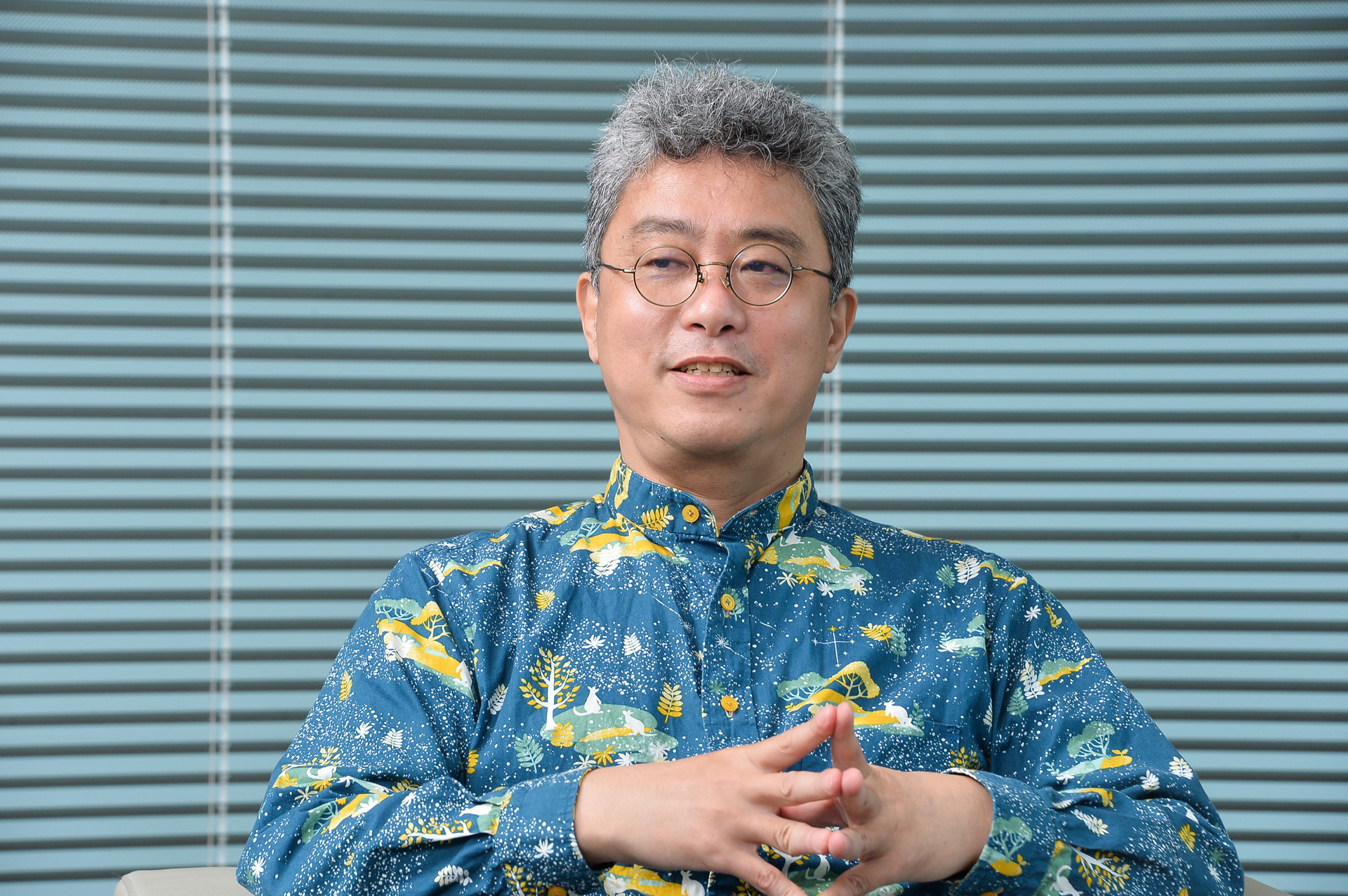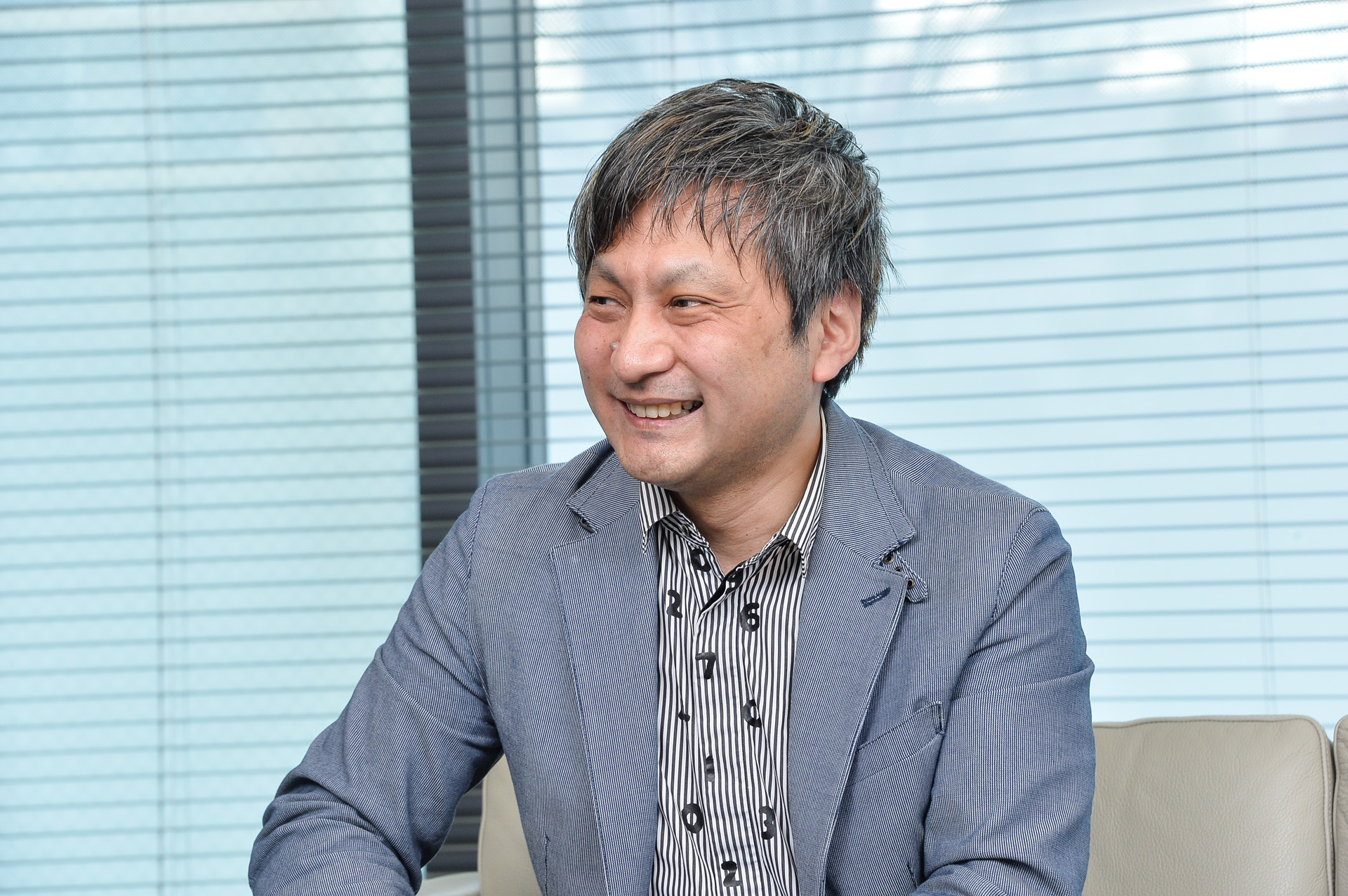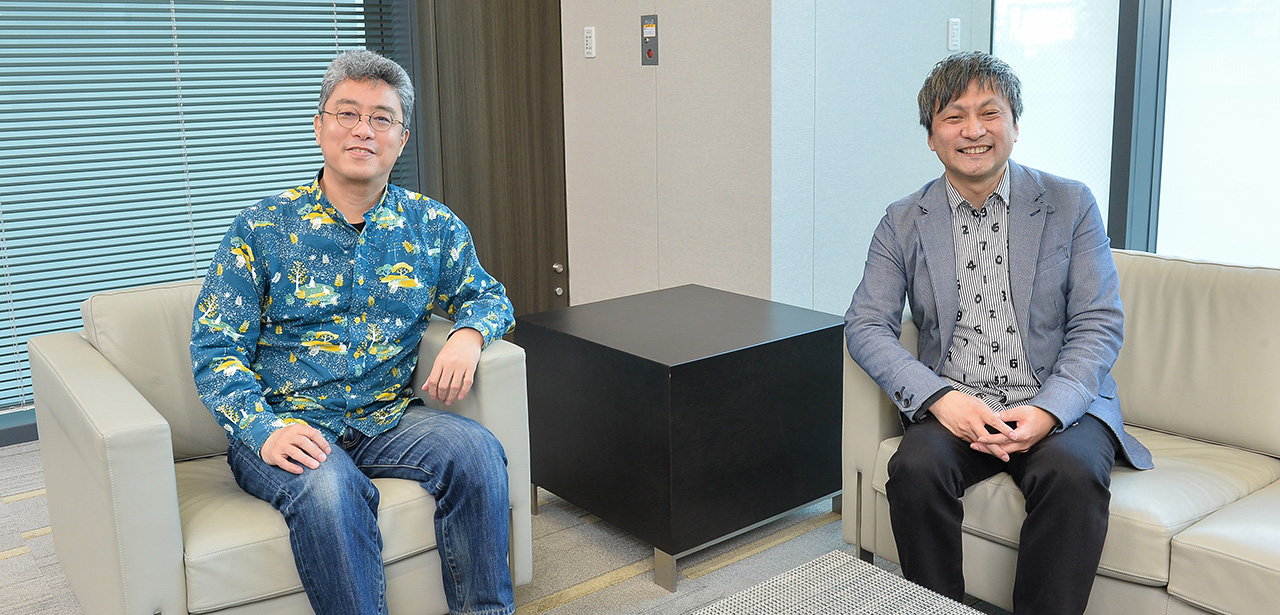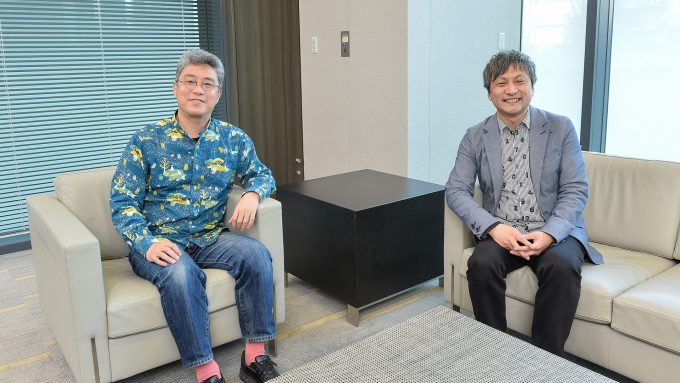“WE DISCUSS VANA’DIEL” is a series of conversations between Producer Matsui and special guests who are familiar with FINAL FANTASY XI (FFXI). Our thirteenth guest is Koji Aoyama, the original Director of PlayOnline (POL) and current Producer of the MMORPG DRAGON QUEST X Online (DQX Online). In this third part, Mr. Aoyama shared his experiences of working on POL.

Producer of DRAGON QUEST X Online. Following his departure from Hudson, he joined Square (now Square Enix) in 1999 and assumed the role of Director for PlayOnline. Mr. Aoyama then joined the DRAGON QUEST X Online development team as Technical Director and later succeeded Yosuke Saito as Producer in 2018.
Gathering Square’s aces for POL
Now, let's finally talk about the development of POL. Did you have an interest in online games, Mr. Aoyama?
- Aoyama
To tell the truth, I hadn’t played them all that much. I played EverQuest* for the first time when I became involved with POL and FFXI. I primarily played alone, but there were times when English-speaking players approached me and gave me money before I even knew what was going on (laughs), and I thought online games were an amazing world.
* EverQuest is an MMORPG released in North America in 1999. What were your thoughts when you heard that the FF series was releasing an MMORPG?
- Aoyama
I was earnestly very excited. I believed it was almost an “obligation” for the FF series to create an MMORPG. After all, this was the same company that leveraged cutting-edge technology to make use of the large capacity of CD-ROMs for FFVII, so I assumed they’d aim for front and center in the new world of online games and MMORPGs.
- Matsui
For me, the FFXI project started at a time where I felt it’d be difficult to stay in game development unless something new came around. As the number of people working on a project increases, so does the work of managing staff members, and this meant a lot of work that wasn’t directly related to game production.
In the midst of that, FFXI proved to be highly rewarding in terms developing its systems and gameplay. I may not have stayed in game development if FFXI wasn’t an MMORPG. That said, I never would’ve imagined I’d be working on it for over 20 years. (laughs) - Aoyama
In a similar vein, I also used to think that I was free to go once POL was launched. With prior games, we stayed up all night or whatever it took to meet the mastering deadline, then it was “All right! Time to go play!” from there, so POL and FFXI were a wake-up call to how, with online games, the launch is only the starting line. That experience helped me in DQX Online, where I was able to explain to our staff that the real work begins after launch.
The POL project was first announced at the Square Millennium Event in January 2000, but when did the project actually begin?
- Aoyama
Personally, I started working on it almost as soon as it was announced, since January 2000 was also when I transferred from the patent office to the technical development division. Of course, research for the project had already been well underway by then.
Which parts of POL were you primarily responsible for, as a programmer?
- Aoyama
I was in charge of what would’ve been the equivalent of a web browser on a PC. Later, starting from the beta version, I was assigned to the role of Director, which oversaw both designing and planning staff.
POL was conceived as an online portal for not only game services, but also comics, music, video streaming, and other content. What did you think when you first heard about it?
- Aoyama
At the time, I didn’t have any doubts and simply figured it was feasible. In fact, our development on the comics and other content had already progressed considerably.
There were also many other games planned besides FFXI. Though our plans didn’t come to fruition due to various problems, I believe the concept of POL itself was feasible even back then. In fact, similar services are commonplace today. However, the concept fell short in terms of cost-effectiveness. - Matsui
It was a bit too early. If it all went as planned, POL would’ve been an amazing service…
- Aoyama
Yes, I do think it was premature. Unfortunately, not all those ideas were realized, partly due to my lack of ability.
When conceptualizing POL, were there any concerns about the level of technology that was available in 2002?
- Aoyama
The technology was brand new, and there were many hurdles to overcome. First of all, the original PlayStation 2 wasn’t designed for internet connectivity. It required users to purchase additional hardware; on the software side, there were several layers of communication between the game program and the hardware, but no programming for TCP/IP*.
* TCP/IP are communication standards which enable devices to send data over networks such as the internet. So it was lacking many of the features we’ve come to expect in modern game consoles.
- Aoyama
Although we could just write our own code for anything the console didn’t come with, the tricky part was the internet. Aside from a number of international rules, users are free to set their own specifications in the internet world. In other words, even if we followed the international rules, we couldn’t guarantee that our features would work correctly for each specification. It might even cause something to work fine in other countries, when it doesn’t work in ours.
* Yoshiki Kashitani, former Chief Network Programmer for POL and former Main Programmer for FFXIII.
Creating the TCP/IP layer in the midst of that was a challenge, and we were doing something very new from a technical perspective. Mr. Kashitani* and Mr. Kasuga* were in charge, and even thinking about it now, it was an amazing team. I think that alone speaks volumes about how much Square prioritized assigning their ace members at the time to developing POL.
* Hideyuki Kasuga, former Network Programmer for FFXI and former Lead Programmer for FFXIV. POL also published comics, albeit few in number.
- Aoyama
Frankly, my memory is rather hazy about how much of this information was made public, but we were aiming for an interface where the camera moved from panel to panel. Many web comics nowadays are automatically laid out according to a format, or only can be enlarged, but POL’s comics panned through individual panels, so the programming cost per chapter was very high. POL content was very elaborate in other aspects too, not just comics. Square’s mindset back then was that each piece of content had to be developed to be as good as it could possibly be. (laughs wryly) That was a good thing, but from a development cost perspective, it was a bit of a pain.
What sort of cooperation and information exchanges went on between the FFXI development team and the POL development team?
- Aoyama
Our teams collaborated on the friend list, I believe.
- Matsui
That’s right. The same friend list was to be used across all games that supported POL, so Mr. Fujito* and Mr. Tanaka* from the FFXI development team were in contact with the POL team.
* Yoji Fujito, Director for FFXI.
* Hiromichi Tanaka, original Producer for FFXI. - Aoyama
We typically worked independently, but the POL team did provide certain elements for the FFXI team, such as the aforementioned communication layer. That’s actually where I thought Square and the current Square Enix were well-organized; tasks were divided between different teams as much as possible, which worked as independently as they could with a minimum level of communication. Regular meetings to share information were something we didn’t have.
Conversely, did the FFXI team have any requests for the POL team?
- Matsui
We’d heard that many games would be compatible with POL in the future, so we thought it might be nice if users could use the same avatar across all of them. At the time, however, we didn’t know of any launchers or platforms that were integrated with multiple games, so we didn’t have many concrete ideas about what we wanted to do.

Which team was in charge of the "Vana'diel Tribune" content on POL?
- Aoyama
The POL team was in charge of that. Of course, we had a lot of help from the FFXI team.
- Matsui
The POL team handled the planning aspects, while the content production was led by Mocchi* from the Community team.
* Kazuyoshi Mochizuki, Community Manager. - Aoyama
To tell the truth, it was quite the difficult project. Nowadays, MMORPGs and smartphone games often hold in-game events or have monthly updates, but FFXI didn’t have those kinds of regular events back then.
- Matsui
That’s true. Back then, version updates were less about holding new events, and more about implementing features that weren’t previously in the game.
- Aoyama
The “Vana’diel Tribune” project began from the idea that since users were paying a monthly subscription, we ought to provide them with new information on a monthly basis. So I remember doing my best to publish content at least once a month.
Were there any plans for version updates or additional features for POL?
- Aoyama
I actually didn’t have any plans like that, since I figured my work on POL would be finished after mastering. But that wasn’t the case at all, and I was busier after the release than during development. The FFXI development team had a lot of detailed requests, like making maintenance announcements via POL. Nowadays, announcements like that are handled on official websites and social media, but since we didn’t have that sort of system in place yet, we ended up with various tasks which required adding all sorts of features after launch.
* Sage Sundi, former Global Online Producer for FFXI.
As for management, Sage Sundi* later joined our staff and taught us all sorts of things about online games, which was great. If Sage had joined earlier, we would’ve known in advance that we would be busier after the service started. (laughs)

So your experiences with POL are what taught you the lesson you later shared in DQX Online, that the launch was only the beginning.
- Aoyama
That's right. I was involved in DQX Online as a technical director at first, and I particularly made it a point to remind the programmers that they would be busier after launch. There would only be more and more modifications to our base programming as time went on, and so we established a number of rules at the start of the project so we would have an easier time making modifications.
- Matsui
We had naming conventions in FFXI too, such as one where we assigned special prefixes to each programmer to avoid duplicate names when naming functions.
- Aoyama
Those kinds of practices would be considered a problem today, since development staff constantly come and go throughout a project’s lifetime. Some staff members used naming conventions where they added initials to file names, which I urged them to discontinue when we were working on DQX Online.
If you were to create a new POL, what would it be like?
- Aoyama
We may pride ourselves on creating high-quality content, but in a sense, the tendency to try and refine everything to the max is also one of Square Enix’s weak points. It goes back to what I mentioned earlier, like flipping through individual panels of a comic, or thoroughly researching games and friends list before releasing our own. When you’re designing an online platform, that sort of mindset bloats the development workload.
If I were to create a service like POL today, I’d make it compact and a relatively small platform which allows for free content creation. The POL team wouldn’t be in charge of stuff like the “Vana’diel Tribune”; those would be delegated to the FFXI team instead. That said, I believe Square Enix isn’t very proficient at that sort of workflow. - Matsui
We can’t help but do everything to the best of our ability.
- Aoyama
That’s true. If I were to become the director of a similar project, I’d probably go back to being nitpicky with all sorts of content again.
* Part 4 will be available on October 26, 2022.




